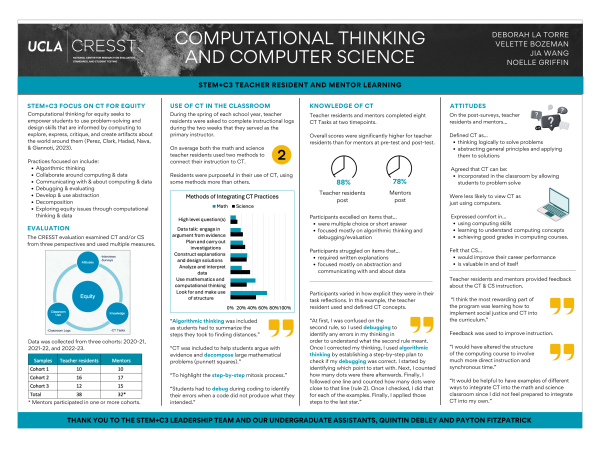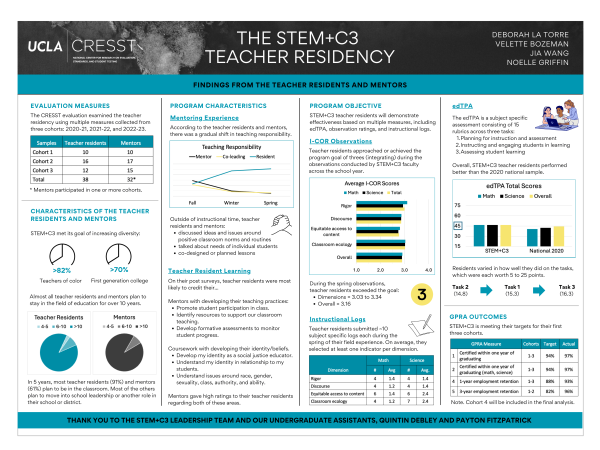News
Stay informed about the latest insights, developments, and advances at CRESST


STEM+C3 Project’s Impact on Teacher Development and Computational Thinking at the September 20th Conference
October 16, 2024
On Friday, September 20th, Deborah La Torre and Velette Bozeman presented at the STEM+C3 conference*, marking the culmination of a multi-year initiative focused on teacher professional development. The project, evaluated by CRESST, was funded through a Teacher Quality Partnership grant from the Department of Education and emphasized a residency model to train teachers. This conference, hosted by LAUSD, UCLA Center X, UCLA Teacher Education Program, and the Centinela Valley Union High School District (CVUHSD), celebrated the conclusion of this project, highlighting its impact on both teachers and students.
The STEM+C3 Project and Its Goals
The STEM+C3 project aims to enhance teacher effectiveness through a residency model, integrating hands-on teaching experience with mentorship. Over several years, teachers and mentors have worked closely to foster professional growth and develop teaching practices focused on student engagement, equity, and computational thinking. CRESST, as an evaluator, has provided detailed insights through data collected from three full cohorts starting in August 2020, August 2021, and August 2022. There was one person in Cohort 4, who we did not include in the study. The pre-service and in-service teachers, known as teacher residents and mentor teachers, worked directly together for one year while the pre-service teacher did their student teaching.
An additional goal of the residency program was to equip teacher residents with the skills necessary to become effective educators, emphasizing fostering diversity within the teaching workforce. The program trained secondary math, science, and computer science teachers. More than 70% of teacher residents were first-generation college graduates, and over 82% identified as teachers of color. The diversity within the program was a key achievement, ensuring that the educators reflected the communities they serve.
Key Findings
The CRESST evaluation showed strong results, with teacher residents outperforming the national average on subject-specific assessments, including the edTPA, a performance-based test used to measure teaching skills. Residents excelled in the three key areas assessed: planning for instruction, engaging students, and assessing learning.
Teacher residents credited their mentors for supporting their growth as educators, particularly in promoting student participation and developing formative assessments to track progress. Additionally, the coursework helped residents develop a strong sense of identity as social justice educators, with a focus on understanding issues around race, gender, class, and authority.
The partnership between mentors and teacher residents was critical in the program, as evidenced by high resident and mentor ratings. This collaborative environment encouraged the co-planning of lessons, discussions about classroom routines, and addressing student needs. Residents and mentors also firmly committed to staying in the field, with many planning to continue teaching for at least ten years, ensuring a long-term impact on the education system.
Emphasizing Computational Thinking and Social Justice
A unique feature of the STEM+C3 project is its focus on integrating computational thinking (CT) and computer science (CS) into classrooms, with a particular emphasis on equity. Teacher residents and mentors learned how to incorporate CT concepts such as algorithmic thinking, debugging, and abstraction into their lessons. This approach allowed students to learn computational thinking and problem-solving and apply these skills to real-world problems, fostering critical thinking and problem-solving abilities.
The post-surveys highlighted the confidence teacher residents gained in transferring CT skills to other subject areas. Many expressed that CT would improve their career performance. Residents reported that CT enabled them to teach students how to decompose large mathematical problems, debug their thinking, and argue with evidence, thus creating a more interactive and student-centered classroom environment.
A notable achievement was the way CT was linked to social justice. Residents integrated it into their curriculum to encourage students to explore equity issues through data and computational tools. This innovative approach empowered students to engage with complex societal problems while developing their technical skills.
Conclusion
The STEM+C3 conference on September 20th celebrated the progress and lessons learned through this groundbreaking initiative. Deborah La Torre and Velette Bozeman will share CRESST’s evaluation of the program’s achievements and the transformative experiences of the teacher residents and their mentors. The residency model has proven a powerful tool for teacher professional development, particularly in fostering diversity, equity, and computational thinking in education.
As the program concludes, the impact on teachers and students will continue to resonate, contributing to more inclusive and innovative classroom environments. The multi-year project has prepared a new generation of teachers and set a precedent for how residency models and computational thinking can be leveraged to enhance education for years to come.
*Presentation slides below; click on the image to view the full-size PDF.




